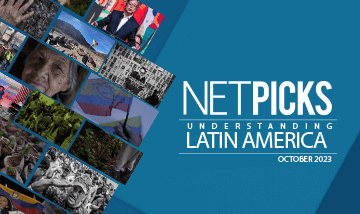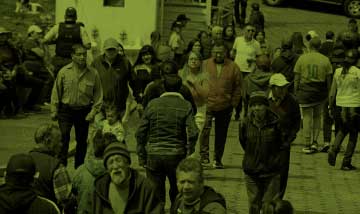Índice
- IN COLOMBIA’S LA GUAJIRA, THE NATIVE WAYUU ARE FORGOTTEN IN THE DUST
- REDIRECTING ASYLUM-SEEKERS FROM U.S. TO GUATEMALA WAS A CRUEL FARCE, REPORT FINDS
- PERU PASSES CORONAVIRUS RISK TO THE WORKING CLASS
- THE LIVES OF MEXICO’S MAQUILADORA WORKERS ARE BEING PUT AT RISK BY LAX COVID-19 RULES AND THE DEMANDS OF INTERNATIONAL TRADE
- BRAZIL’S ‘LAND-GRABBERS LAW’ THREATENS AMAZONIA
- AFTER A FIGHT OVER CONTROL OF BRAZIL’S FEDERAL POLICE, RAIDS TARGET BOLSONARO’S POLITICAL RIVALS
- BRAZIL’S LEFT AND RIGHT UNITE TO LAUNCH PRO-DEMOCRACY MANIFESTO
Understanding Latin America
This month we bring you seven articles: from Colombia where a giant coal mine has disrupted the life of the indigenous Wayuu, and is now pressuring local mine workers over their salaries and conditions; from Guatemala, to where supposed Honduran and Salvadorian ‘asylum seekers’ have been sent by the US as part of an agreement with that country; from Peru where the informal workers that form the majority of the country’s economically active population are bearing the brunt of the Covid-19 crisis; from Mexico where the Maquila owners are pushing to get their employees back to work, despite the risks these would run in a country where the new coronavirus is rampant, from Brazil where the Amazon forests are under threat from legislation that would allow the Amazon lands of non-recognized indigenous peoples’ to be occupied and exploited.
.
In this edition, as a special delivery, we add two articles about the political situation in Brazil due to the turmoil caused by president Jair Bolsonaro’s authoritarian outbursts and shambolic response to coronavirus.
IN COLOMBIA’S LA GUAJIRA, THE NATIVE WAYUU ARE FORGOTTEN IN THE DUST
The Cerrejón coal mine, owned by the U.K.-Swiss-Australian conglomerate of BHP, Glencore and Anglo-American, is one of the world’s largest. Situated in the territory of the indigenous Wayuu in the La Guajira region of Colombia’s Caribbean coast, the mine began operating in the 1980s and is now the 10th largest in the world, and uses more than 16 million liters (4.2 million gallons) of water a day. La Guajira, meanwhile, is a dry windy region prone to desertification, and though the mine has offered local people work, over the past three decades it has also disrupted the Wayuu’s traditional way of life, provoking major social and environmental changes and disruption. Drilling, daily explosions, and the high demand for water have accelerated desertification, and reduced the Wayuu’s access to water, in the process pushing them to migrate and leave their ancestral territories behind. Now, even the jobs are at stake. The fall in the price of coal has led to the mine owners demanding concessions from the workers. In the meantime, the Wayuu who migrated to Venezuela in the good times, have been returning, but to a place which is now one of the main gateways for Venezuelan migrants, a chaotic border where smugglers operate in the open, where international aid is weak, and there is little to offer to either the indigenous population or those arriving from Venezuela.
Nicoló Filippo Rosso, May 13th, 2020
https://news.mongabay.com/2020/05/in-colombias-la-guajira-the-native-wayuu-are-forgotten-in-the-dust/
.
REDIRECTING ASYLUM-SEEKERS FROM U.S. TO GUATEMALA WAS A CRUEL FARCE, REPORT FINDS
In recent months, the United States has expelled some 20,000 people who crossed the country’s southern border with Mexico without authorization, people looking for asylum. Many are still in Mexico on the border, while others, Salvadorians and Hondurans, were sent to Guatemala before the crisis hit, as part of an agreement the US signed with that country: supposed ‘Safe Third Country’ for people fleeing violence. For the moment the program is in suspension, a victim of Covid-19, but while it was in operation, it was not a success. Guatemala is poor, with little capacity to receive so called ‘asylum seekers’ who, according to the author of this article, had only had “72 hours to make the decision about whether they would remain in Guatemala, return to the countries they fled, or try to find refuge elsewhere.” Arriving with little or no resources, many did not understand that rather than in the US, they were expected to seek asylum in Guatemala. But for many staying in Guatemala was never a real option. Hondurans and Salvadorians have fled the high levels of violence in their own countries, but the gangs that operate in those countries, also operate in Guatemala. Adding to the problems is that seventy-five percent of those ‘asylum-seekers’ were women, and children, now in a country that suffers from high rates of violence against women, and relative impunity for those who commit those crimes.
Cora Currier, May 19th, 2020
https://theintercept.com/2020/05/19/asylum-seekers-guatemala-report
.
PERU PASSES CORONAVIRUS RISK TO THE WORKING CLASS
The Peruvian economy was not in great shape before the Covid-19 crisis hit. Depending to a large degree on the export of raw materials, as other South American nations, its working population is mainly informal. In 2018, for example, only 27.6 per cent of workers held formal jobs, while 72.4 percent were employed informally. Perhaps unsurprisingly, the lockdown restrictions imposed by President Vizcarra, necessary to stop the spread of the virus, have hit the informal sector extremely hard. Many were obliged to make the hard choice between defying the rules, and being accused of being irresponsible, or going hungry. Many chose the former. Measures were taken to ease the situation by providing payments to those classified as being poor or extremely poor according to State records, but the state system was not up to the task. Many payments, low as they were, simply did not arrive. At the same time the government decided to allow businesses to suspend workers without pay, further complicating the economic outlook. The result has been more poverty and ill health, and even a type of reverse migration, where many people, ‘los caminantes’ have left the city to return to the rural areas. The left, in the form of Veronika Mendoza of the Nuevo Peru coalition has been calling for a better solution: a universal relief fund and a tax on wealth.
Alejandra Dinegro Martínez May 19th, 2020
https://nacla.org/news/2020/05/19/peru-coronavirus-working-class
.
THE LIVES OF MEXICO’S MAQUILADORA WORKERS ARE BEING PUT AT RISK BY LAX COVID-19 RULES AND THE DEMANDS OF INTERNATIONAL TRADE
Mexican President Manuel López Obrador recently travelled to Washington. One of his objectives was to finalize the implementation of the recently renegotiated free trade agreement with the US and Canada that is of major importance for the Mexican economy. Meanwhile, back in Mexico, on May 13th, when the Covid-19 pandemic was reaching its height, the Lopez Obrador government announced the easing of what have been already been seen as some of the laxest restrictions in the Americas. The objective was to return to a “new normal”. That “new normal” could, however, be extremely problematic for the workers in Mexico’s Maquilas, especially in the city of Juarez, in the State of Chihuahua close the US border. The Maquilas are a key part of the Free Trade Agreement, but as the author of this article points out, labor conditions in these plants have been the subject of debate for years because of low salaries and lax safety measures. The “new normal” now includes something else: the risk of contagion by SARS-CoV2. But the factory owners are keen to get people back to work despite the risks, even complaining about forced closure, and in many cases not even shutting down their Maquilas as required. The choice for the workers is stark, go hungry or go back in conditions that are far from ideal. With the risk of dying.
María Encarnación López, May 25th, 2020
https://blogs.lse.ac.uk/latamcaribbean/2020/05/25/the-lives-of-mexicos-maquiladora-workers-are-being-put-at-risk-by-lax-Covid-19-rules-and-the-demands-of-international-trade/
.
BRAZIL’S ‘LAND-GRABBERS LAW’ THREATENS AMAZONIA
This year, deforestation in Brazil has increased every month in comparison with the same month in 2019: by 109% in January, by 34% in February, by 30% in March, and by 64% in April. Now, with the return of the dry season, a large increase is expected from June onwards. But the Amazon forests have another threat to contend with: legislation that allows people to simply claim government land. That threat comes in the form of Proposed law PL-2633/20, currently in the Chamber of Deputies, and classified as “urgent”, whose approval would allow the legalization of land of up to 650 ha based on nothing more than “self-declarations”. The legislation principally affects “vacant” or “unassigned” state lands in the Amazon, including 277 indigenous territories that have not yet been fully recognized, and whose protection was recently removed by FUNAI, Brazil’s indigenous agency. Ending this system has long been a conservation priority, and a technical note listing the legislation’s many illegalities has been compiled by the public prosecutor’s office. Sixty non-governmental organizations in the Brazilian environmental movement have also signed a manifesto opposing the law.
Philip M. Fearnside, May 25th, 2020
https://news.mongabay.com/2020/05/brazils-land-grabbers-law-threatens-amazonia-commentary/
.
AFTER A FIGHT OVER CONTROL OF BRAZIL’S FEDERAL POLICE, RAIDS TARGET BOLSONARO’S POLITICAL RIVALS
In the statement announcing his resignation, ex Justice Minister Sergio Moro, a one-time ally of President Jair Messias Bolsonaro, stated that the President wanted to control the Rio de Janeiro branch of the Federal Police. The new commander of the Rio force took office on May 25th. The next day Police carried out operations targeting Bolsonaro’s political opponents, targeting, amongst others, the governor of the State of Rio de Janeiro, Wilson Witzel, one of Bolsonaro’s right wing rivals. Although the charges against Witzel are plausible, the move has raised concerns about a political interference. After blocking Bolsonaro’s first choice for Chief of Federal Police (a personal friend he claimed) the Supreme Court is now investigating both Bolsonaro himself for interfering in the force, as well as a campaign of Fake News in which Carlos Bolsonaro, the President’s son, and widely known as the informal chief of the “hate cabinet” may be implicated. The campaign was directed, amongst others, at the Court itself. Meanwhile, the President’s oldest son, Flávio Bolsonaro, is also under investigation by the local and Federal Police for corruption and possible links to organized crime. In the meantime, the Military, also a victim of Fake News, has been keeping quiet, for the moment.
Rafael Moro Martins, May 31th, 2020
https://theintercept.com/2020/05/31/police-raids-bolsonaro-political-moro/
BRAZIL’S LEFT AND RIGHT UNITE TO LAUNCH PRO-DEMOCRACY MANIFESTO
Prominent figures from across Brazil’s political spectrum have a published a high-profile manifesto calling for a united front to protect Brazilian democracy and lives, amid growing alarm over president Jair Bolsonaro’s authoritarian outbursts and shambolic response to coronavirus. It has over 100,000 signatories. The Movimento Estamos Juntos (We’re In This Together Movement) urges Brazilians to mobilize in defense of “life, freedom and democracy”. Flávio Dino, a prominent leftist and Governor of Maranhão State, said the new movement was inspired by Diretas Já – a historic pro-democracy campaign that helped end two decades of military rule in the 1980s. Marcelo Freixo, a leftwing congressman, also endorsed the movement’s creation alongside major figures from Brazilian academia, culture and politics, including centre-right ex-president Fernando Henrique Cardoso. The movement’s launch came as a record 33,274 new coronavirus cases raised the country’s total to nearly 500,000. Nearly 29,000 Brazilians have died since the first death was confirmed in mid-March, and only the US, the UK and Italy have lost more lives. Polls suggest Bolsonaro still enjoys the backing of 30% of Brazilians, but has lost millions of voters in recent weeks, implying that he could only be reelected at the next presidential election in 2022 if his opponents remain divided.
Tom Phillips, May 31st, 2020
https://www.theguardian.com/world/2020/may/31/brazils-left-and-right-unite-to-back-pro-democracy-manifesto-bolsonaro





